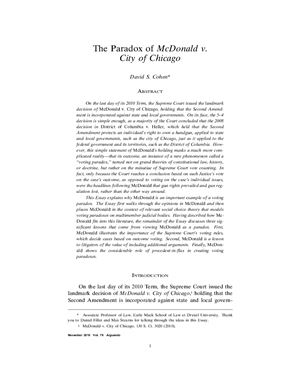40000 знаков.
David S. Cohen.
On the last day of its 2010 Term, the Supreme Court issued the
landmark
decision of McDonald v. City of Chicago, holding that the Second Amendment is incorporated against state and local govements. On its face, the 5–4
decision is simple enough, as a majority of the Court concluded that the 2008
decision in District of Columbia v. Heller, which held that the Second
Amendment protects an individual’s right to own a handgun, applied to state
and local govements, such as the city of Chicago, just as it applied to the
federal govement and its territories, such as the District of Columbia. How-
ever, this simple statement of
McDonald’s holding masks a much more complicated reality—that its outcome, an instance of a rare phenomenon called a
voting paradox, tued not on grand theories of constitutional law, history,
or doctrine, but rather on the minutiae of Supreme Court vote counting. In
fact, only because the Court reaches a conclusion based on each Justice’s vote
on the case’s outcome, as opposed to voting on the case’s individual issues,
were the headlines following McDonald that gun rights prevailed and gun regulation lost, rather than the other way around.
decision of McDonald v. City of Chicago, holding that the Second Amendment is incorporated against state and local govements. On its face, the 5–4
decision is simple enough, as a majority of the Court concluded that the 2008
decision in District of Columbia v. Heller, which held that the Second
Amendment protects an individual’s right to own a handgun, applied to state
and local govements, such as the city of Chicago, just as it applied to the
federal govement and its territories, such as the District of Columbia. How-
ever, this simple statement of
McDonald’s holding masks a much more complicated reality—that its outcome, an instance of a rare phenomenon called a
voting paradox, tued not on grand theories of constitutional law, history,
or doctrine, but rather on the minutiae of Supreme Court vote counting. In
fact, only because the Court reaches a conclusion based on each Justice’s vote
on the case’s outcome, as opposed to voting on the case’s individual issues,
were the headlines following McDonald that gun rights prevailed and gun regulation lost, rather than the other way around.

